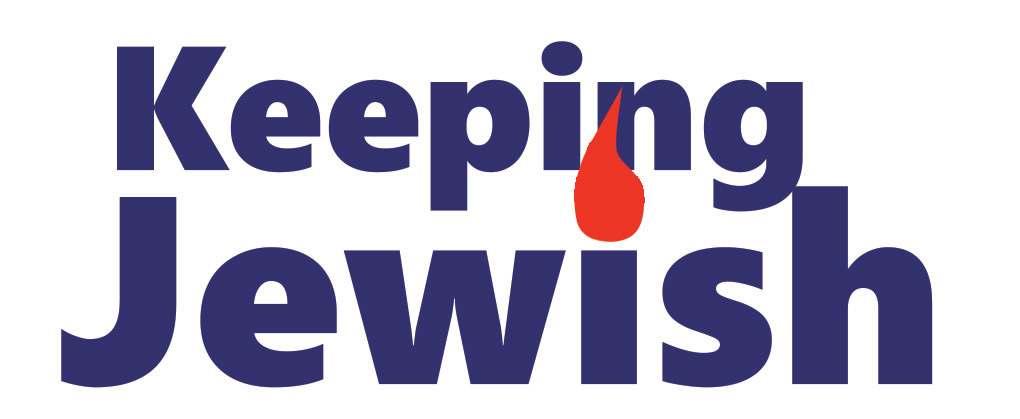
Crossing the Red Line
The tolerance we can no can no longer afford to tolerate afford to tolerate
Spring Fruit Salad
Greens, mango and Greens, mango and strawberry recipe
Hey Mickey
Israel’s first army general Israel’s first army general was actually an American Mother’s Day’s Mother
A story that includes A story that includes fact, fiction, and flowers and flowers


What we saw: Republican Congressman and Democratic State Representative visit Israel BS”D 100 and Counting…
Helen
still enthusiastic about life
Tucson centenarian
Goldman is
Tradition, Inspiration and Celebration · May 2024 - Iyar 5784
·
Published by Chabad Tucson

The Jewish outreach and education network of Southern Arizona
2443 E 4th Street, Tucson, AZ 85719
EXECUTIVE DIRECTOR
Rabbi Yossie Shemtov
REBBETZIN
Chanie Shemtov
OUTREACH DIRECTOR
Rabbi Yehuda Ceitlin
PROGRAM DIRECTOR
Feigie Ceitlin
Affiliates:
Congregation Young Israel, Chabad at the University of Arizona, Chabad on River, Chabad of Oro Valley, Chabad of Sierra Vista, Chabad of Vail and Lamplighter Chabad Day School of Tucson

EDITOR
Rabbi Yehuda Ceitlin
COPY EDITOR
Suzanne Cummins
CONTRIBUTING WRITERS
Zalman Abraham, Yehuda Altein, Symour Brody, Feigie Ceitlin, Juan Ciscomani, Alma Hernendez, Mendel Kalmenson, Menachem Posner, Mordechai Schmutter, Lilian Wasserman and Benjamin Weiss.
COVER PHOTO
Martha Lochert Photography
SPECIAL THANKS Chabad.org
EDITORIAL INQUIRIES OR ADVERTISING
Phone: 520-881-7956
Email: info@ChabadTucson.com
Keeping Jewish is published in print periodically by Chabad Tucson and is distributed free in Tucson and around Southern Arizona
Chabad Tucson does not endorse the people, establishments, products or services reported about or advertised in Keeping Jewish unless specifically noted. The acceptance of advertising in Keeping Jewish does not constitute a recommendation, approval, or other representation of the quality of products or services, or the credibility of any claims made by advertisers, including, but not limited to, the kashrus of advertised food products. The use of any products or services advertised in Keeping Jewish is solely at the user’s risk and Chabad Tucson accepts no responsibility or liability in connection therewith.
Note: “G-d” and “L-rd” are written with a hyphen instead of an “o .”This is one way we accord reverence to the sacred divine name. This also reminds us that, even as we seek G-d, He transcends any human effort to describe His reality.
Tolerance We Can’t Afford Anymore
British author Neil Gaiman said, “Libraries are the thin red line between civilization and barbarism.” Sadly, we’re seeing how libraries—and the universities that contain them—are enabling people who are not only crossing but stomping on that thin red line.
Protestors have been allowed to openly chant approval for the murder, rape, and abduction of Jewish people. Under the veneer of free speech, this was allowed to persist for weeks.
The United States Congress recently passed the Antisemitism Awareness Act, with an overwhelming majority codifying the International Holocaust Remembrance Alliance (IHRA) definition of antisemitism, the first time such a definition was enshrined into federal law.
The few opposed to the bill claimed that it curtails free speech. This country was built upon the premise of freedom of expression, and the same First Amendment that protects freedom of religion protects freedom of speech.
But in this instance, freedom of speech is not at risk—quite the contrary.
Jewish people have long championed free speech and care for minorities. In fact, the Torah instructs us to be compassionate to the stranger “for you know the feelings of the stranger, since you were strangers in the land of Egypt” (Exodus 23:9).
But the speech here should never have been free. It should never have been protected, let alone enthusiastically cheered on. This is not a call for peace, justice, or care for the oppressed. This is an open call for the annihilation of Jewish people and of the only Jewish country in the world.
I have experienced just such hate firsthand back in 2004. I was working at the time as the Communications Director of
By Rabbi Yehuda Ceitlin
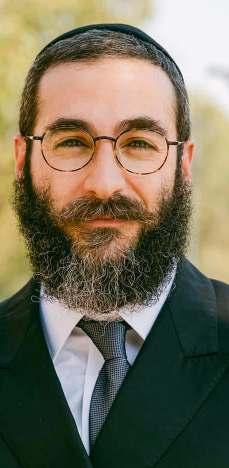
the Rabbinical Centre of Europe. As part of my dealings, I was invited to a European interfaith conference focusing on tolerance and peace in Brussels, Belgium.
Organizers were considerate enough to order me kosher food that came packed and fully sealed for the evening gala. As the Saran Wrap covering my plates crinkled, a conversation about Jewish dietary laws and general practice was sparked. Those seated around the table found it fascinating, and I enjoyed sharing the information.
Then, the man sitting alongside me, dressed in an orange robe indicating he was a Buddhist monk, interrupted the friendly conversation about the Jewish religion.
“Don’t you think Ariel Sharon enjoys seeing the blood of Arab children being spilled?” he abruptly asked.
The table went silent. I am embarrassed to say that I was quiet as well. His question was disturbing on so many levels that I remained speechless for some long moments.
How do you respond to such an antisemitic fabrication that is rooted in the blood libels of the primitive Middle Ages? The age-old claim that Jews drank the blood of Christians was now updated to Muslims (when, in reality, Jews are prohibited from consuming even the blood of animals, going so far as to discard any egg in which a blood spot is found).
How can a religious figure make such a dubious statement during an event whose stated purpose was promoting mutual understanding?
Young at the time and not wanting to create a scene, I smiled sheepishly and engaged him in a conversation. Until today, I regret that I did not respond with the same force with which he presented his original question/statement.
Because the red line between free speech and hateful speech can be razor-thin, and the red line between hateful speech and hateful actions is razor-thin as well.
We have seen how decades of demonizing Jews allowed the Hamas atrocities of October 7, 2023, to take place — and how that same philosophy enabled their justification and even encouragement by otherwise well-educated professors and students in the United States.
- Rabbi Yehuda Ceitlin is the Outreach Director of Chabad Tucson, the Jewish network of Southern Arizona
| May 2024 | Keeping Jewish
2 OPINION
Outdoor Events to Celebrate Lag BaOmer
Chabad centers around Arizona will hold outdoor events marking the festive Jewish holiday of Lag BaOmer on Sunday, May 18, joining Jews worldwide in demonstrating their Jewish pride and commitment.
The day commemorates the anniversary of the passing of the great sage and mystic Rabbi Shimon bar Yochai (also known by the abbreviation of his name, Rashbi), author of the Zohar—the foundational work of the Kabbalah.
Rashbi wanted the day his soul ascended on High to be one of joy. The light and warmth of a bonfire — a frequent feature of Lag BaOmer, especially in Meron, Israel, where Rashbi is laid to rest — is symbolic of the great flame of G‑dliness Rashbi brought into the world through his teachings.
Passover and Shavuot some 2,000 years ago, a plague raged amongst the disciples (Rashbi was among them) of the great sage
Rabbi Akiva and on Lag BaOmer the dying ceased.
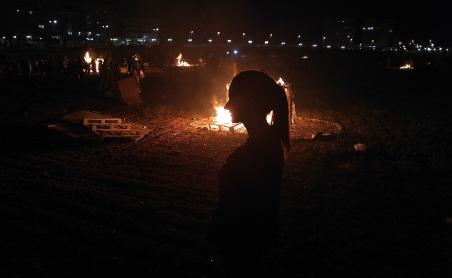
Historically, Lag BaOmer was celebrated by going out to the fields for introspection and celebration.
The Lag BaOmer celebrations are organized in keeping with the Rebbe’s call to celebrate Jewish pride and unity on Lag BaOmer, and is one of thousands of similar Lag BaOmer celebrations in cities across the globe hosted by Chabad‑Lubavitch.
In the Tucson area, Jewish community members are expected to gather for communal and private events. Among the events open to the public are the BBQs hosted by Chabad of Oro Valley, Chabad on River, and Chabad of Vail, Arizona. These will include delicious flame‑grilled kosher favorites, including burgers, hot dogs, and all the trimmings, as well as salads, drinks, and s’mores.

Shabbat
Lunch
& Learn
Lunch is on us each month at Join us for a delicious lunch, learn about a variety of topics related to aging, and take home a Shabbat dinner!

Monthly at Handmaker beginning at 11:30am Friday, May 10, 2024 - The Importance of Fall Prevention, with Elizabeth Reeves from PCOA Friday, June 14, 2024 -Learn Tools for Protecting Yourself from Cyber-Stalkers, with Levia Nahary, Cyber Security Educator.
There is no cost to attend, but reservations are required. For more information, to RSVP, or for info on assistance with transportation, contact Nanci Levy at nlevy@handmaker.org or 520-322-3632.
This program was funded by a grant from the Jewish Community Foundation of Southern Arizona.

NEWS
100 and Counting…
Tucson centenarian Helen Goldman is still enthusiastic about life
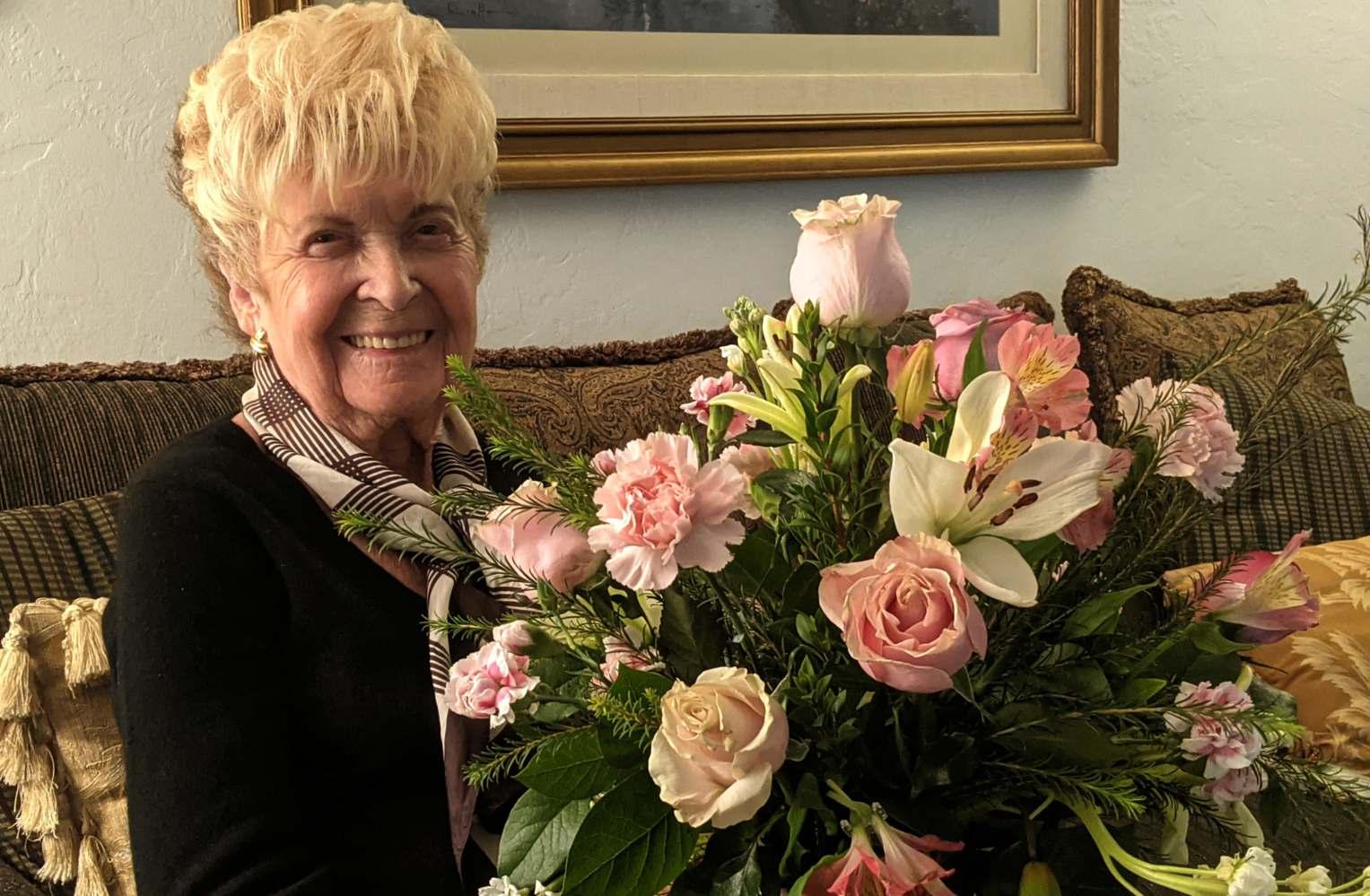 By Lilian Wasserman
By Lilian Wasserman
The Annual Salute to Centenarians held at the beginning of the month in Tucson was billed as one of the largest known gatherings of people 100 years and older in the United States. There were 25 centenarians in attendance, according to KOLD-TV News Anchor Dan Marries, who emceed the event. “I love hearing their stories,” he said.
One of the honorees was Helen Goldman, who was born in 1922. When asked about being a centenarian, she doesn’t fail to assert her personality. When an interviewer with Tucson Lifestyle magazine said, “Thank you for making time to talk,”
she replied, “Let’s hope it’s both our pleasures.” Her personality sparks at every opportunity.
Goldman’s life began in Brooklyn.
Her grandparents were Jewish immigrants from Eastern Europe, and her mother and aunts grew up speaking Yiddish. They did not teach Yiddish to their children, but Helen learned it by sitting under the table and listening when her mother and aunts would talk. They did not realize that she was quickly picking up the language, and it must have surprised everyone when she started saying things in Yiddish.
Helen never pursued a career. Though she had considered becoming a lawyer at one time, she changed directions after meeting her husband André. She happily embraced life as a loving wife, and mother to their three children: Robert, Richard, and Heidi.
“I felt, and still feel, that raising children is the most important job you can have,” she insists. “It wasn’t a job, really; it was a joy.”
Helen and her family lived on Long Island, where André worked in real estate. They were active in the Nassau Community Temple in West Hempstead, Long Island.
She and her husband donated a cherished family Torah to the Temple which was used for many years.
But in 1969, they moved to Tucson after André became enamored with the unhurried pace and cowboy culture of the Old Pueblo. At that time, Tucson boasted a population of just 345,000.
Though Andre chose Tucson, the transition was difficult for the children. The eldest Robert was already in college, but Richard and Heidi were still in public school. Richard had to switch schools during his last year of high school. Heidi was
| May 2024 | Keeping Jewish 4
PROFILE
On his way to Washington, D.C. in 1988 as a newly elected Senator, Lieberman stopped in Brooklyn, NY, to seek the Rebbe’s blessing (Photo: JEM)
in grade school. She said, “It was a huge adjustment.” They had come from a dominantly Jewish community in Long Island, and at age 11, Heidi found herself in a school where she was the only Jew. She came home and asked her mom where her “horns” were after a fellow student queried her about that.
Helen and Heidi live together here in Tucson. Helen says, “Generations should not be segregated. I age well in part because my daughter lives with me. I always have a connection.” She notes that her aunt also lived to over 100 but was alone and very bored at the end. (Longevity is so pervasive in Helen’s family that UCLA has actually studied them. They have still to release the results).
Heidi is the only one of Helen’s children living in Tucson, but her sons call her daily. Robert lives in Scotts Bluff, Nebraska, and Richard in Calabasas, California. Grandchildren and great-grandchildren are scattered around the country. (Helen has not traveled since Covid, but her sons and family come to see her.)
As for their Judaism, the whole family is as diverse religiously as they are geographically. Bob, the oldest son, is not affiliated with a synagogue. His wife (now of blessed memory) was not Jewish, but with
her support, he and their family celebrated Jewish holidays and culture in their home.
The middle son Richard, is a dedicated Jew who attends synagogue each week and celebrates every holiday.
And though Judaism is still clearly a big part of their life, Heidi and Helen are not associated with a specific synagogue in town. She notes that living this long has put her in a place without a community. The friends she had are all gone, and she does not have any connection with younger people except her daughter. Living to 100 years old is a blessing; yet it leaves a person isolated in many ways.
Helen’s love of life is not one that requires luxury or wealth. She works out several times a week. She drove until she was 97 or 98 years old (she cannot remember which). Her energy does not falter.
When prompted to give some advice for the rest of us, she said the following:
“You make your own legacy in your own life. Life is for living – not existing. Keep your eyes open – keep learning. And don’t wait for others to entertain you. Enjoy other people, but bring your own comedy. You are a gift to yourself and others when you do that.”
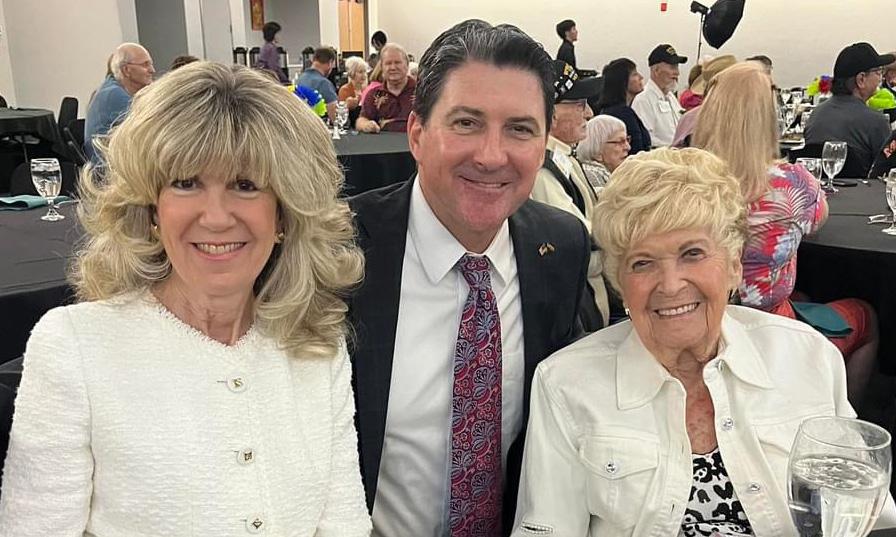
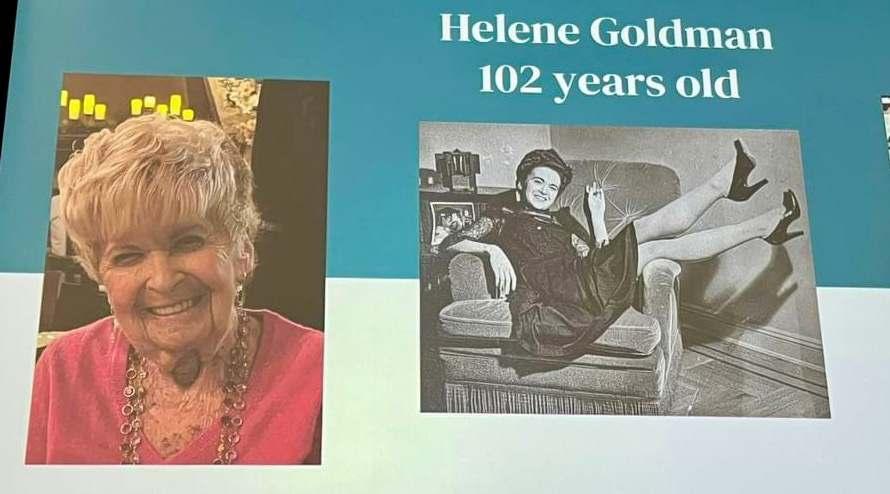

Keeping Jewish | May 2024 |
5 PROFILE
Helen Goldman, her daughter Heidi Goldman and KOLD-TV News Anchor Dan Marries
The screen at the Annual Salute to Centenarians in Tucson
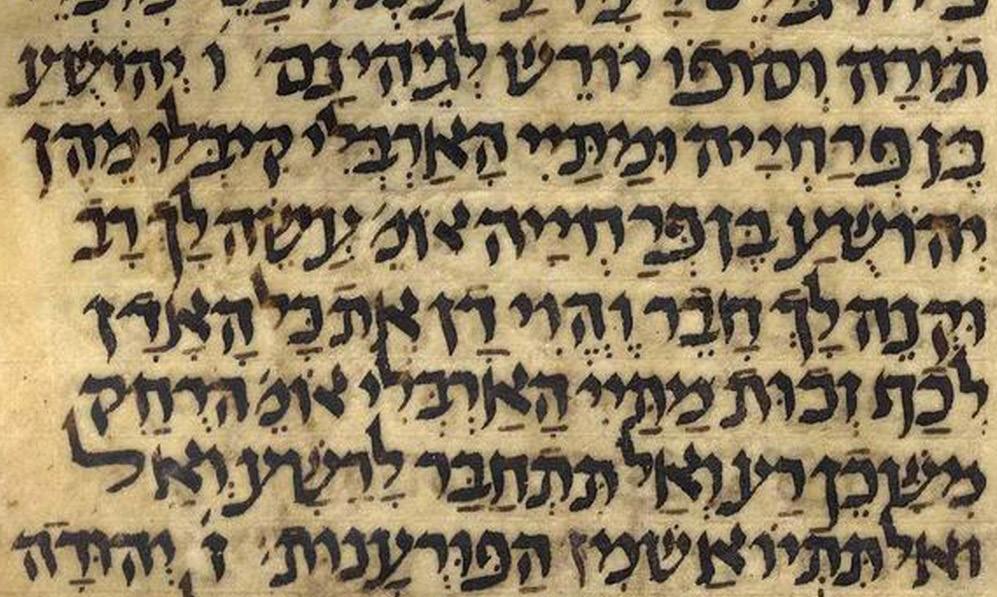
12 Facts You Should Know About Ethics of the Fathers (Pirkei Avot)
By Yehuda Altein
Pirkei Avot, Ethics of the Fathers, a Talmudic tractate devoted to Jewish morals, values, and ethics, is customarily studied during the six weeks between Passover and Shavuot. Read on for 12 facts about this timeless jewel of Jewish wisdom.
1. It Is Part of the Mishnah
The Mishnah is the primary text of the Oral Torah and the foundation upon which the Talmud is constructed. It encompasses 63 tractates covering every area of Jewish law: agriculture, holidays, family relations, civil law, sacrifices, ritual purity, and many more. One of these tractates, however, focuses not on law but on Jewish ethics: Pirkei Avot, lit. “Chapters of the Fathers,”
more commonly known as “Ethics of the Fathers.”
2. It Has 5 Chapters and 96 Mishnahs Pirkei Avot is divided into five chapters, and each is subdivided into numerous bite-sized paragraphs called mishnahs.
A typical Mishnah in Pirkei Avot will cite the name of a Talmudic sage and convey several concise life lessons he taught. Others are anonymous, apparently the consensus of the sages of the time. In total, these five chapters comprise a total of 96 mishnahs.
3. It Is Studied Every Shabbat From Passover to Shavuot
It is customary to study Pirkei Avot during the six weeks between Passover and Shavuot. One chapter is studied each Shabbat after the afternoon Minchah prayer.
Various reasons are given for this practice. According to one perspective, these weeks herald the onset of warmer weather, a time when our passions and drives are often stirred. Studying Pirkei Avot and applying its life lessons are meant to fortify us spiritually and prepare us for the moral challenges the summer months present.
Alternatively, the study of these chapters is meant as a preparation for Shavuot, the
holiday of the giving of the Torah, in line with the dictum that “Ethical conduct is a prerequisite to Torah.”
4.ASixth Chapter WasAdded Later Since Pirkei Avot only has five chapters, and there are six weeks between Passover and Shavuot, the sages of the Geonic period (between the 6th and 11th centuries) appended a sixth chapter to its text. This chapter stems from the Beraita—a body of teachings formulated by sages of the Mishnaic era (between the years 10 and 220 C.E.) but not included in the Mishnah. Known as Kinyan Torah (“Acquiring Torah”), the sixth chapter of Pirkei Avot emphasizes the Torah’s immense value and
| May 2024 | Keeping Jewish
JUDAISM 101 6
Pirkei Avot from the Kaufmann Manuscript, the most complete early manuscript of the Mishnah that exists
the virtues inherent in its study, making it an appropriate study for the week directly before Shavuot.
5. Some Learn It Throughout the Summer Many communities (including Chabad) continue the chapter-a-week regimen throughout the summer months, extending until Rosh Hashanah, which results in the entire tractate being studied four times. By the time the last round comes along, fewer than six weeks remain until the Jewish New Year, so chapters are doubled up to facilitate its completion.
6. WeAdd a Preface and anAfterword It is customary to recite an added Mishnaic passage both before and after the weekly chapter. The prefacing Mishnah highlights the inherent value of every individual: “Every Jew has a share in the World to Come, as the verse states, ‘All your people are righteous; they shall inherit the land forever…’” The concluding mishnah emphasizes the beauty of doing mitzvahs: “G-d desired to bring merit to Israel; that is why He gave them an abundance of Torah and mitzvahs…”
7. It Records the Transmission of the Oral Torah
The first Mishnah of Pirkei Avot summarizes the transmission of the Oral Torah: “Moses received the Torah at Mt. Sinai. He transmitted it to Joshua; Joshua transmitted it to the elders; the elders transmitted it to the prophets; and the prophets transmitted it to the Men of the Great Assembly.”
The subsequent mishnahs record the names of the transmitters of the Oral Torah after the Men of the Great Assembly, along with the ethical teachings of each one. Pirkei Avot thus depicts an unbroken chain of tradition from Moses all the way to the sages of the Mishnah.
8. Its Moral EthicsAre Divinely Inspired Why does Pirkei Avot begin by affirming that Moses received the Torah at Mt. Sinai? This statement highlights what sets Pirkei Avot apart from the many moral codes authored throughout history. Those codes are the work of humans, originating from the limited perspective of the mortal mind. Pirkei Avot, however, is Divinely inspired,
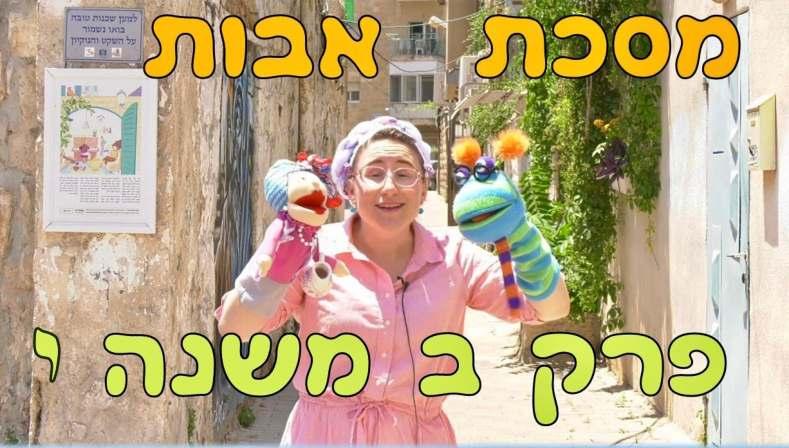
an integral part of the Torah given to Moses at Mt. Sinai.
9. It Conveys Timeless Lessons Pirkei Avot may be ancient, but its teachings are as relevant and meaningful today as when they were first imparted millennia ago. Here is a sampling from each chapter:
Shimon the Righteous would say: The world is supported by three things: Torah study, Divine service, and good deeds. (1:2)
Hillel says: A boor cannot fear sin; an ignoramus cannot be pious. If you are shy you will not learn; if you are shorttempered you cannot teach. If you are overly preoccupied with business, you will not become wise. If there is no one to step up to the plate, do your best to be the one to do so. (2:5)
Rabbi Chanina son of Dosa says: If others are pleased with you, G-d is pleased with you; if others are not pleased with you, G-d is not pleased with you. (3:10)
[Shimon] son of Zoma says: Who is wise? Someone who learns from everyone. Who is strong? Someone who overcomes their base instincts. Who is wealthy? Someone who is happy with their lot. Who is respected? Someone who respects others. (4:1)
If love is dependent on a factor, when the factor disappears, so does the love. But
repository of commentaries accessible in several languages. Some of these works focus on analyzing the text, while others bring its lessons home with thoughtprovoking anecdotes and stories.
12. It’s a Prerequisite to Being a Chassid The Talmud famously states, “One who desires to be a chassid (“pious person”) should fulfill the teachings of [Pirkei] Avot.” This underscores the basic truth that the essence of piety is simply about being a mentsch—upholding the Torah’s moral values and treating others with sensitivity and respect.
To begin learning, visit: Chabad.org/Avot
when love is independent of any factor, it will never disappear. (5:16)
Rabbi Yossi son of Kisma said: I was once traveling on the road when I met a wealthy man. After exchanging greetings, he said, “My teacher! Come and live in my city, and I will give you thousands upon thousands of gold coins, precious stones, and pearls.” I replied, “Even if you give me all the silver, gold, precious stones, and pearls in the universe, I will only dwell in a place of Torah.”
(6:9)
10. It Has Been Translated Into Multiple Languages
Pirkei Avot is a classic that has been translated into multiple languages, including English, Spanish, French, and Russian. This enables its timeless lessons to be studied and appreciated by an ever-broader audience.
11. Hundreds of Commentaries Were Written on It
Pirkei Avot is one of the most prolifically elucidated Jewish texts, boasting a rich


Keeping Jewish | May 2024 |
JUDAISM 101 7
is a chapters, Passover period This and Mishnah. and
Sarah Jacobs and her puppets teach Pirkei Avot to children in a video series on ToraForKids.com
The beautifully illustrated Living Lessons Pirkei Avos book published by Hachai Publishing

Welcome to town: to town: Jude Saler
 By Benjamin Weiss By Weiss
By Benjamin Weiss By Weiss
Name: Judith Maia Saler, but most call me Jude.
Alittle about yourself: I was born in Connecticut, but shortly after, we moved to Concord, Massachusetts, because my father taught at Brandeis University. I taught Culinary Arts at Brookline High School in Brookline for 25 years.
Moving to Tucson:
I moved to Tucson a few months ago to be closer to my mother (we lost my father during Covid). I really appreciate how kind and open people are in Tucson.
Keeping busy:
I opened Goddess Pizza, a vegan and vegetarian catering company. I specialize in Sourdough Pizza, bialys, and bagels, all baked in a wood-fired oven. I’m currently exploring the option of being kosher certified.
Currently reading/learning: Sandor Katz’s Fermentation Journeys: Recipes, Techniques, and Traditions from around the World.
Favorite Mitzvah/holiday:
Passover because it’s filled with tradition, including food and stories, songs, and prayers. It is also a time when the whole family comes together, and it has always held a special place in my heart.
Cherished Jewish memory:
Celebrating Shabbat while working on a kibbutz, Degania Bet, which is south of the Kinneret (Sea of Galilee). We all cooked the food together and then dressed up and celebrated together. It was beautiful and delicious.
Go-to Yiddish or Hebrew word: Oy Vey! (Yiddish for ‘oh my’ or ‘oh no’)
Historical Jewish figure: Hillel the Elder (the 10th-century sage). He coined the phrase, “If I am not for myself, who will be for me? But if I am only for myself, what am I?”
October 7:
October 7 shook me to the core, and I am confused and angry at the protests on U.S. campuses that put Jewish students in danger.
Define happiness:
Cooking beautiful meals for people. While I graduated with a Nutrition degree, I disliked being a Nutritionist because it involved teaching people to be on caloriedeficit diets, and I just wanted to feed people.
Hobbies:
Besides cooking, my hobbies are gardening, fermentation, and volunteering at the Tucson Village Farm.
Comfort food:
All things Sourdough, including bread, challah, pizza, bialys, and bagels.
Kvetch:
When people rely on social media for information, it propagates disinformation and ignorance. As Senator Daniel Patrick Moynihan once said, “Everyone is entitled to their own opinion; no one is entitled to their own facts.”
Kvell / nachas:
My mother. She’s 91 years of age and still creates art and submits artwork to be picked for shows.
Your claim to fame:
Having an understanding of the nutritional components that can elevate the overall health benefits of food. For example, fermenting foods contributes to a healthy gut microbiome. In addition to helping assimilate nutrients from foods, a gut biome is responsible for creating 30 hormone-like compounds, including Serotonin and Dopamine.
Something you’re looking forward to… Starting a gig at the Heirloom Farmers Market in Oro Valley in September and offering cooking and baking classes in the fall.
| May 2024 | Keeping Jewish 8
LOCAL
Jude Saler and her mother Joyce Saler
Refreshing Strawberry Mango Salad
It’s springtime, and the abundance of fresh strawberries and ripe mangoes makes this salad a delightful choice for a refreshing seasonal dish. Celebrate the vibrant flavors of spring with this invigorating Strawberry Mango Salad.
Ingredients:
- 2 heads of Romaine Lettuce
- 1 mango
- 16 oz strawberries
Dressing:
- 1 cup vegetable oil
- 1 cup sugar
- 1/4 cup vinegar or lemon juice
- 1 clove garlic
- Small onion
Directions:
1. Prepare lettuce by cutting it.
2. Cube the mango and remove the stems from the strawberries, then cut them into quarters.
3. In a blender or food processor, combine vegetable oil, sugar, vinegar or lemon juice, clove garlic, and small onion and three strawberries.
4. In a large salad bowl, toss together chopped romaine lettuce, cubed mango, and quartered strawberries.
By Feigie Ceitlin

5. Drizzle the dressing over the salad just before serving, tossing gently to coat evenly.
6. Serve immediately and enjoy the burst of fresh flavors!
Blessing on Fruits:

Baruch atah A-donay, Elo-heinu Melech Ha’Olam borei pri ha-aitz.
Blessed are You, L-rd our G-d, King of the universe, who creates the fruit of the tree.
Blessing on Vegetables:
Baruch atah A-donay, Elo-heinu Melech Ha’Olam borei pri ha-adamah.
— Rebbetzin Feigie Ceitlin is the program director of Chabad Tucson and head of school of Lamplighter Chabad

Keeping Jewish | May 2024 | 9 KOSHER
*
Blessed are You, L-rd our G-d, King of the universe who creates the fruit of the earth.
B’tayavon!
Day School.
U.S. While gardening, disinformation Patrick entitled to still to… the

Just a little over six months ago, the world witnessed Israel being terrorized at the hands of Iran-backed Hamas. October 7, 2023, will go down as the deadliest day for the Jewish people since the Holocaust. The unprovoked attacks – egregious acts of inhumanity and war– cannot and will not be forgotten.
Again, this past month, we saw yet another unprecedented attack on Israel, with Iran launching hundreds of unmanned aerial vehicles (UAVs) and missiles on the country. The latest escalation of aggression by Iran – the world’s leading state sponsor of terrorism – is alarming and should spur Congress to pass legislation supporting our allies and holding Iran and its proxies accountable.
I recently returned from a congressional delegation to Israel alongside nearly 20 of my House Republican colleagues. In my conversations with Israelis across the political spectrum, it’s clear that the shock and tragedy of Hamas’ brutal and unprecedented October 7 attack remains at the forefront of their minds. And with the ongoing threats and attacks from Iran, the Israeli people know no sense of peace.
I saw firsthand the aftermath of the
atrocities at Kibbutz Nir Oz, one of the communities massacred by Hamas on that dark day. My colleagues and I also visited the site of the Nova music festival, where hundreds of young Israelis – and individuals from across the world – were systematically raped, tortured, and slaughtered. It is impossible to put what they went through into words – what happened there was nothing less than the manifestation of pure evil.
We must also remember that for 134 innocent people – including eight Americans – and their families and friends, the nightmare is not over. These innocent hostages remain in the hands of brutal terrorists, suffering ongoing abuse. I met with the parents of Hersh Goldberg-Polin, an American citizen still being held hostage in Gaza. Their pain is unimaginable, but their strength to do everything possible to bring their son home is an inspiration. In Congress, I remain committed to doing everything in my power to reunite them with their son and free all of the remaining hostages.
Another encounter that stood out to me was an impromptu run-in with Rami Davidian, a 58-year-old Israeli farmer. Rami demonstrated remarkable heroism on
United Against Terror Insights from Israel’s front lines
By Juan Ciscomani
October 7, risking his own life by driving in and out of the Israeli communities besieged by Hamas to save innocent people. Through sheer bravery and determination, Rami saved hundreds of people.
Rami’s story—and the strength of the Polin-Goldberg family—highlighted a key takeaway from the trip: Israel’s incredible determination. Rami’s story may have been uniquely heroic, but his determination and resilience are shared by Israelis from around the country and all different walks of life. They’re also shared globally by the Jewish community, from Tel Aviv to Tucson. In a time when antisemitism is tragically on the rise, we have to show support for our Jewish friends and neighbors both at home and abroad.
Israelis are determined to ensure their families can live in peace and security in their homes and their homeland. They aren’t asking Americans to fight for them; they just want the tools needed to defend themselves. In one meeting with Israeli officials, they assured us it wasn’t a matter of IF Israel would win – it’s a matter of how quickly they could get the job done. With America’s support, they can achieve this outcome more swiftly while protecting innocent civilians.
Israel is an essential American partner –our only democratic ally in a dangerous region. A beacon of democracy in the Middle East, Israel is on the frontlines, and America must stand with them. I walked through ground zero of the October 7 attacks, speaking to survivors and meeting with people who had loved ones massacred in their own beds. Hamas, Iran, and its proxies wish that same fate on Americans. A safe and secure Israel benefits America –and, frankly, the entire world.
On one of our trip stops, our group visited Yad Vashem, Israel’s memorial to victims of the Holocaust. We know the danger of silence in moments in history like this. For decades, Americans have promised our Jewish brothers and sisters “Never Again” in remembrance of the Holocaust. And that promise has never been as crucial as it is right now. America must be there for our friend in its time of need.
- Congressman Juan Ciscomani (R-AZ) represents Arizona’s 6th Congressional District in the US House of Representatives, sitting on the House Appropriations Committee and the House Veterans Affairs Committee.
| May 2024 | Keeping Jewish
ISRAEL AT WAR
10
–and walked meeting massacred Americans. America –visited victims our Again” that is esents
Traveling for the Truth Fighting antisemitism through a trip to Israel Israel
By Alma Hernandez

Over a month ago, I led a bipartisan legislative trip to Israel, for which I received much hate on social media. No one batted an eye when lawmakers have taken trips to Mexico, Ukraine, Canada, Germany, and Taiwan, to name a few.
Yet, when I led a trip to Israel, I was attacked. There was no attempt to ask why the trip happened or what we did; instead, there was the instinctual mistrust and assumption that something nefarious was happening because it was Israel.
So, once again, in the face of personal attacks and Jew hatred, I must stand up for myself and my community, feeling that their mere existence is constantly under threat.
I’m reminded of a quote that the late Israeli prime minister Golda Meir, the first female head of state in the Middle East, used to be fond of: “Ein breira.” Simply, it means “no choice.” As I’ve sadly had to learn, Jews have no choice but to stand up for themselves because the alternative is our demise.
I, for one, will never apologize for leading the trip. Many asked why we would go and how this was relevant back home, and the answer is simple: Israel is one of our fastest-growing trade partners in many areas. We have an Arizona-Israel Trade Office that has been flourishing for many
years and many partnerships that have helped us with water and science.
Israel has already provided tremendous jobs and economic development in Tucson at Raytheon and many local suppliers. Israel and Raytheon developed the renowned “Iron Dome Missile Defense System,” which is saving the lives of both Jewish and Arab Israelis.
It also hits close to home for many of us as we have many Arizonans who have family and friends who live there, but it is also the Jewish homeland, and we must never forget that.
I never felt the need to justify this trip over the numerous international trips the legislative body has taken. Still, I also realize it is important to share why the trip was so important to the world.
We have sent delegations in the past to Israel, but this was an opportunity for my colleagues to bear witness to the atrocities of Oct. 7. Based on our state’s close relationship with Israel, this was also an opportunity to show solidarity with a nation that is already providing productive benefits to Arizona, a time to firmly stand up with the only democracy in the Middle East whose people, along with Americans, were slaughtered in the most horrific ways imaginable.
We needed to see this with our own eyes and help everyone understand that there is much more to this conflict than what we see on social media. We heard from a young man who has two family members who were taken hostage on Oct. 7. Despite being Muslim, they were not spared the horrors perpetrated by Hamas terrorists.
Personally, my life has been endangered by terror supporters who have gone beyond the freedom of speech, and unfortunately, things are no longer the same or safe for many of us. Antisemitism is plaguing our communities and especially our college campuses, where some students are fearful to even walk down the center of their campuses without being accosted. I wanted
my colleagues to understand why I fight so hard against the evil of antisemitism and why I will not stop fighting.
Lastly, people need to know that the war would end immediately if Hamas simply surrendered and released the hostages. It was important for Arizona, and I will continue to spread the facts and truth even when I am met with hostility because when we say never again, we truly mean it.
- Rep. Alma Hernadez is the state representative for District 20. She chairs the bipartisan caucus and serves on the health and human services and regulatory affairs committees. She has proudly served this district for six years.

Keeping Jewish | May 2024 |
ISRAEL AT WAR
11
In Jewish thought, the term afterlife is a misnomer. Colloquially, the expression “afterlife” suggests that when life comes to an end, something else follows. In contrast to this, Judaism teaches that life is eternal—it has no end. It is experienced in a physical body for a period of time, and when that time is up, we lay down our body, and the soul returns to a higher dimension of eternal existence.
A contemporary analogy for this can be understood from a television broadcast: a transmitting station broadcasts images and sounds in the form of energy waves, which are received by a physical device that displays them. Imagine that something goes wrong with the device itself so that its screen and speakers no longer display the images, sounds, ideas, feelings, and actions encoded within the energy waves.
The transmitting station, and the energy waves incorporating the media, exist no less than before; it is only that the receiving device is no longer translating them into physically visible and audible phenomena.
By way of analogy, we can thus envision the soul itself as the transmitting station (i.e., the source of one’s personality, character traits, thoughts, emotions, actions, etc.) and the body as the receiving
Rise in Peace Life: Chaim
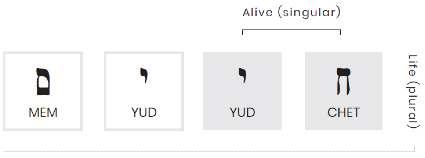 By Mendel Kalmenson and Zalman Abraham
By Mendel Kalmenson and Zalman Abraham
device. The death of the body does not in any way affect the integrity of the soul, nor does it halt the soul’s self-expression (analogous to the energy waves that are emanating through space); it is only that we have been deprived of the ability to see and hear it in the phenomenal world.
The comfort in knowing that the soul lives on may be overshadowed by our inability to fully comprehend the concept of life beyond the physical realm. We may have disconcerting questions about the quality of the soul’s existence and experience in the next world: What is it like for a soul to be “deprived” of physical existence? What kind of “life” does one have as a soul?
The Rebbe once wrote a letter to a family who lost a loved one (dated September 27, 1978) in which he described the soul’s experience when it departs this world:
“Needless to say, insofar as the soul is concerned, [death] is a release from its ‘imprisonment’ in the body. For so long as [the soul] is bound up with the body, it suffers from the physical limitations of the body, which necessarily constrain the soul and involve it in physical activities that are essentially alien to its purely spiritual nature…. In other words, the departure of the soul from the body is a great advantage and ascent for the soul.”
Accordingly, the Hebrew word for life, chaim, is phrased in the plural and literally translates as “lives,” indicating multiple phases and expressions of a single, neverending life.
Famously, on the last day of Moses’ life, he tells the Jewish people: “See, I set before you this day life and prosperity, death and adversity... choose life.” Obviously, everyone would choose life over death, so what kind of choice is Moses actually offering?
The explanation is that, essentially, Moses is offering sound investment advice. You can spend your life investing in selfcentered pursuits that are physically pleasurable but fleeting, or you can invest in that which is eternal—life.
The Talmud teaches: “Righteous individuals are considered alive even in their death,” whereas “wicked individuals are considered as dead, even during their lifetime.”
This is because righteous individuals spend their lives infusing eternal meaning into everything they do.
In stark contrast to the culture of “Eat, drink, and be merry, for tomorrow we die,” when Jews have occasion to drink, they say “l’chaim!” reminding each other that there
is so much more to life than the shallow indulgences of the here and now and that every meaningful act one does and every mitzvah one performs creates an energetic imprint that outlives our temporary time in a physical body.
In fact, we learn that even after one’s body is laid to rest, mitzvot performed in the merit of a departed soul helps to continue that soul’s journey and ascent as it travels through the infinite worlds beyond.
Therefore, in Jewish tradition, instead of saying, “May their soul rest in peace,” we say, “May their neshamah (soul) continue to have an aliyah (ascent).” For the soul does not rest; rather, it rises continuously, even after death.
Indeed, this perpetual ongoing elevation process is the essence of life itself.
The Big Idea: We are not physical beings having a spiritual experience; we are spiritual beings having a physical experience.
—An excerpt from People of the Word, by Mendel Kalmenson and ZalmanAbraham, exploring 50 key Hebrew words that have been mistranslated and misunderstood for centuries.
| May 2024 | Keeping Jewish
12
THOUGHT
Mickey Marcus A hero in both America and Israel
By Seymour Brody
David “Mickey” Marcus is a hero who fought for the two countries he loved, America and Israel, and was recognized for his military achievements by both.
Marcus was born in New York’s Lower East Side. He attended West Point, graduated in 1924, and immediately joined the Army Reserve. After completing his active duty requirement, he attended Brooklyn Law School and earned his law degree. He spent most of the 1930s working in the office of the U.S. Attorney but returned to active duty in the army as a lieutenant colonel when World War II erupted.
In May 1944, Marcus got himself sent to the United Kingdom on Civil Affairs business. He then relied on being a West Point classmate of General Maxwell D. Taylor to parachute into Normandy on D-Day with the first wave of Taylor’s 101st Airborne Division despite having no paratrooper training. He took informal command of some scattered paratroopers and was in combat for a week.
After V-E Day in 1945, General Lucius D. Clay asked Marcus to serve on his staff in the occupation of Germany. Marcus was responsible for providing for the millions of displaced persons. Clay required all his subordinates to tour the Nazi concentration camp of Dachau. Marcus was shocked by its horrors; though not previously a Zionist, he began to think differently about a Jewish state.
In 1946, as chief of the Army’s War Crimes Division in Washington, DC, he planned legal and security procedures for the Nuremberg trials and the Tokyo War Crimes Tribunal, ensuring that Nazi crimes were documented. After the trials, he turned down a promotion to brigadier general to return to civilian life and his law practice.
He was awarded the Distinguished Service Medal for his key role in drafting the Instrument of the Italian and German Surrender, and post-war German control
mechanisms. In 1946, he received the honorary Commander of the Order of the British Empire for collaborating with the British armed forces during the war.
In 1947, David Ben-Gurion asked Marcus to recruit a U.S. officer to serve as a military advisor to the nascent Israeli army, the Haganah. Not finding a candidate, Marcus volunteered himself. In 1948, the National Military Establishment agreed informally to Marcus’ mission, on the condition that he conceal his identity and rank to circumvent issues with the British authorities in Mandatory Palestine.
Under the alias “Michael Stone,” he arrived in Palestine in January 1948, and designed a command structure for the Haganah, basing it on his U.S. Army experience. He identified Israel’s weakest points in the Negev south and the Jerusalem area.
Marcus was appointed Aluf (“general”) and given command of the Jerusalem front on May 28, 1948, as Israel fought Arab armies in the War of Independence. As no ranks had been granted to the Israeli high command at that time, he became the first general in the fledgling nation’s army.
During the early morning hours of June 11, 1948, while working with Israeli soldiers to defend against an Arab incursion, Marcus was killed when a young Israeli sentry mistook him for the enemy. He was buried at West Point with full military honors.
Marcus was honored by the Israeli military for his leadership and contributions to Israel’s defense. The Mishmar Davis kibbutz in Judea is named for him. Actor Kirk Douglas portrayed him in the 1966 Hollywood movie Cast a Giant Shadow. Marcus was a hero in the two countries that he bravely served and loved.
-Originally published in Jewish Heroes & Heroines of America: 150 True Stories of American Jewish Heroism (Frederick Fell Publishers, Inc.)
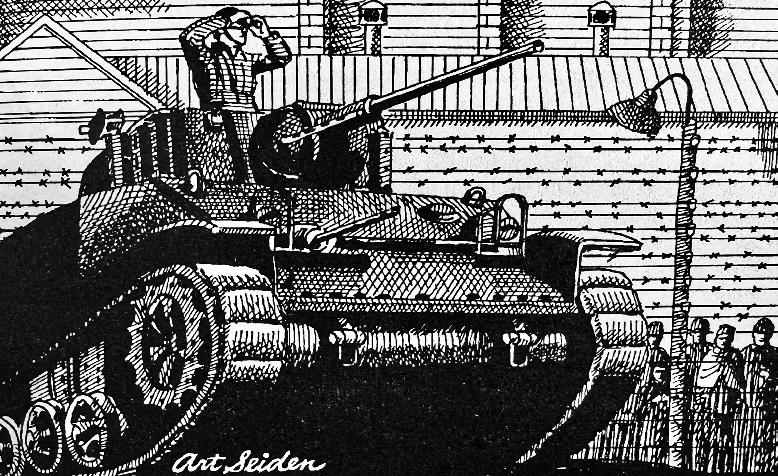

Keeping Jewish | May 2024 | 13
Mickey Marcus * Illustration by Art Seiden
BIOGRAPHY
and
A Mother’s Day Saga A This story involves fact, fiction,
By Mordechai Schmutter By Schmutter
flowers
This story involves fact, fiction, and flowers
The woman who created Mother’s Day is a genius, by my estimation.
It’s even better than, say, Veteran’s Day, because everyone either is a mother or knows someone who’s a mother. Most people are even related to a mother. Some mothers even have their own mothers. This is a gold mine!
And observance is easy. There isn’t any major cleaning or kashering to be done, except maybe after the kids make breakfast.
“But how did this get started?” you ask. Ever since mothers were invented, the secular world has been wondering, “What is the best way to recognize them?” And then someone said, “How about once a year?” And everyone thought that was a good idea.
That was what I thought. So I looked it up. And I now present to you some facts about the invention of Mother’s Day, depending on how loosely you define the word “fact”:
FACT: The person who officially proclaimed Mother’s Day was President Woodrow Wilson, also known as the father of Mother’s Day.
FACT: The mother of Mother’s Day was a woman named Anna Jarvis, who, in 1908, threw two celebrations to honor her mother, Ann Jarvis.
FACT: Ann Jarvis died in 1905.
FACT: Anna didn’t let that stop her. Guests were very confused.
FACT: To be honest, it sounds like it was more of a yahrtzeit seudah.
FACT: Anna had a great time at this yahrtzeit seudah, or as great a time as
 Photo: Nick Fewings/Unsplash
Photo: Nick Fewings/Unsplash
could be expected, and called it “Mother’s Day”, singular, because she only had one mother. So she decided, why not do it every year? Why not push to have the whole country do it every year? Around the anniversary of her mother’s death, specifically.
FACT: When Anna was 12, she heard her mother, (a teacher), tell her students, “I hope and pray that someone, sometime, will found a memorial Mother’s Day commemorating a mother for the matchless
service she renders to humanity in every field of life. Hint hint.”
FACT: Anna quit her job in advertising and started writing to politicians, urging them to declare a national holiday for mothers. At first, Congress rejected her proposal, joking that the next thing they knew, they would also have to proclaim a Mother-inLaw’s Day.
FACT: Mother-in-law’s Day was established in 1934, and it’s the 4th Sunday in October.
Most people get away without doing anything because it’s just a matter of avoiding the “What are you two doing for Mother-in-Law’s Day?” conversation.
FACT: Anna’s original idea had been for mothers to get together and celebrate with each other. This was also the original idea for Groundhog’s Day. And President’s Day.
FACT: After spending 6 years trying to establish Mother’s Day, Anna spent the rest of her life urging people to stop celebrating it. At least the way people do now.
FACT: She was very against how commercial became almost immediately – especially when she walked into a restaurant and saw, on the menu, something called “Mother’s Day salad.”
FACT: It sounded like mulched flowers.
FACT: She didn’t even like how the flower companies were making money off the holiday. When she’d originally gotten them involved, her intention was that you write your mother a personal note and give her one flower. And now it’s turned into buying a card, and then buying a whole bunch of flowers to make up for not having written the card yourself.
FACT: She spent the rest of her life suing anything and everything Mother’s-Dayrelated, even attacking Eleanor Roosevelt for using the day to collect charity for needy mothers.She never got married or had children, as she was too busy raising a stink about Mother’s Day.
FACT: She was the mother of Mother’s Day but then regretted it.
FACT: In short, this is a holiday tinged with guilt if we celebrate it and guilt if we don’t. That’s what makes it Mother’s Day.
| May 2024 | Keeping Jewish
14 HUMOR
1. What is Pesach Sheni?
A. The second Passover
B. The final door [to repentance]
C. The original Mother’s Day
D. The scarlet Passover
2. On which day of the month is Pesach Sheni observed?
A. Iyar 13 (bar mitzvah)
B. Iyar 14 (a month after the Passover sacrifice was brought)
C. Iyar 15 (a month after the first Seder)
D. Iyar 16 (a month after the second Seder)
3. How was Pesach Sheni established?
A. People who had been impure on (the first) Passover petitioned Moses
B. There were not enough goats for everyone in the desert
C. King David, the “master of repentance,” instituted it
D. The origins are not known
4. Who could bring a sacrifice on Pesach Sheni?
A. Only those whose sacrifices died on the morning of the first Passover
B. People with license plates starting with odd numbers
C. Levites and Reubenites
Take the Pesach Sheni Quiz
By Menachem Posner
D. Those who were impure or far from Jerusalem the first time around
5. On Pesach Sheni, morning services are:
A. Longer than usual
B. Shorter than usual
C. The same as usual
D. Highly unusual
6. Must chametz be disposed of before Pesach Sheni?
A. Yes
B. No
C. Only in Temple times
D. Only among some Yemenites
7. What is eaten on Pesach Sheni these days?
A. Bitter herbs
B. Raisins
C. Roasted lamb
D. Matzah
8. True or false: Pesach Sheni is an auspicious time for second marriages
True
False

after Pesach Sheni?
A. Chol Hamoed Sheni
B. Holiday of Shavuot
False
10. Which special day comes four days
C. Lag BaOmer
D. Birthday of Rabbi Akiva

Keeping Jewish | May 2024 |
9. True or false: There is also a Sukkot Sheni one month after Sukkot True
15 GAME FUN PAGE
Answers: 1-A, 2-B, 3-A, 4-D, 5-B (we omit Tachanun, the penitential prayers), 6-B, 7-D, 8-Fal-
se (One may not marry during this time of year), 9-False, 10-C.
Photo: Monica Sauro/Unsplash

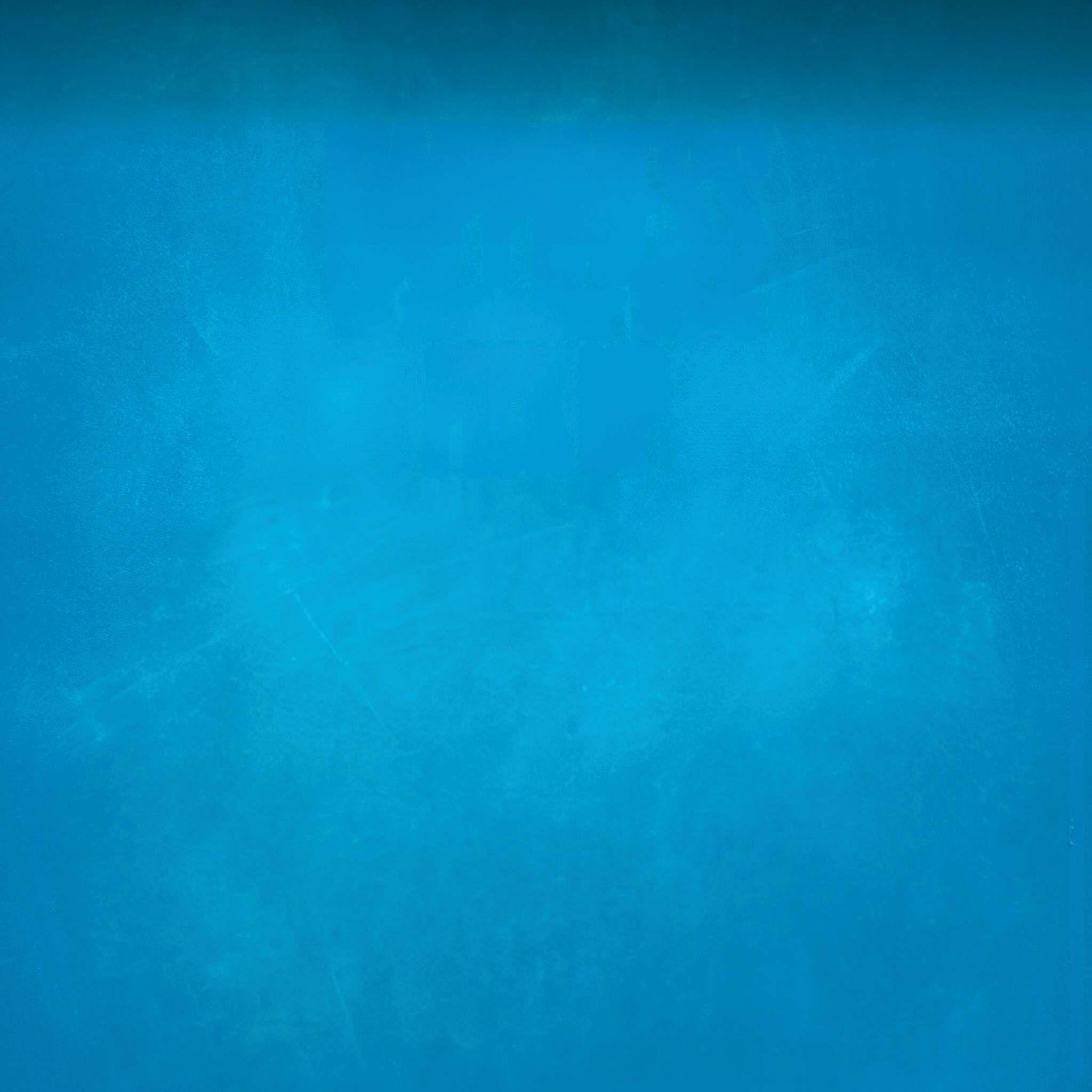

RITA'S ITALIAN ICE RITA'S ITALIAN ICE & FROZEN
& FROZEN CUSTARD 4210 N 1ST AVE SUITE 4210-100, TUCSON, AZ 85719 4210 N 1ST AVE SUITE 4210-100, TUCSON, AZ 85719 520-638-5137 520-638-5137 KOSHER! KOSHER! PAREVE & CHOLOV STAM PAREVE & CHOLOV STAM BH BH
CUSTARD











 By Lilian Wasserman
By Lilian Wasserman








 By Benjamin Weiss By Weiss
By Benjamin Weiss By Weiss






 By Mendel Kalmenson and Zalman Abraham
By Mendel Kalmenson and Zalman Abraham


 Photo: Nick Fewings/Unsplash
Photo: Nick Fewings/Unsplash




